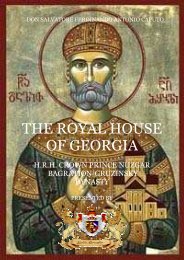here - Nobility Associations
here - Nobility Associations
here - Nobility Associations
Create successful ePaper yourself
Turn your PDF publications into a flip-book with our unique Google optimized e-Paper software.
II who was not in captivity and was in a position to assert her rights. Pedro III<br />
championed his wife's claim to the entirety of the Kingdom of Sicily.<br />
Prior to the Vespers, Pedro (Peter) III had constructed and outfitted a fleet for war<br />
and upon the pope's inquiry of the need for such a great war fleet, Pedro stated that<br />
it was to be used against the followers of Islam along the northern coast of Africa as<br />
he had legitimate interests in trade t<strong>here</strong> and he needed to protect them. So when<br />
Pedro received a request for help from the Sicilians he was conveniently on the<br />
north coast of Africa in Tunis just 200 miles across the sea from the island. At first<br />
Pedro feigned to be indifferent to the request of the Sicilians and to the plight of the<br />
islanders, but after several days to allow a proper showing of deference made for<br />
the pope's consumption, Pedro took advantage of the revolt. He ordered his fleet to<br />
sail for Sicily, landed at Trapani on August 30, 1282. While he marched towards<br />
Palermo, his fleet followed close by the coastal road. Pedro's involvement changed<br />
the character of the uprising from a local revolt into a European War. Pedro arrived<br />
at Palermo on September 2 and initially he was received by the populace with<br />
indifference, it was merely one foreign king replacing another; they much preferred<br />
a free commune under a vague suzerainty of the pope. However, after Pope Martin<br />
made plain his orders for the populace to accept Charles, Pedro made a promise to<br />
the islanders that they would enjoy the ancient privileges they had had under the<br />
Norman king, William the Good. T<strong>here</strong>after, Pedro was accepted as a satisfactory<br />
second choice and was crowned by acclamation of the people at the cathedral in<br />
Palermo on September 4, thus becoming also Peter I of Sicily.<br />
With the pope's blessing the counter-attack from Charles was not long in coming;<br />
his fleet from Naples arrived and blockaded the port of Messina and made several<br />
attempts to land troops on the island, but all were repulsed.<br />
Peter of Sicily<br />
Peter nevertheless pressed his advantage and by February<br />
1283 had taken most of the Calabria coastline. Charles,<br />
perhaps feeling desperate, sent letters to Peter demanding<br />
they resolve the conflict by personal combat. The invader<br />
accepted and Charles returned to France to arrange the duel.<br />
Both kings chose six knights to settle matters of places and<br />
dates. A duel was scheduled for 1 June at Bordeaux. A<br />
hundred knights would accompany each side and Edward I<br />
of England would adjudge the contest; the English king,<br />
heeding the pope, however, refused to take part. Peter left<br />
John of Procida in charge of Sicily and returned via his own<br />
The Hohenstaufen Dynasty - Page 157 of 200



